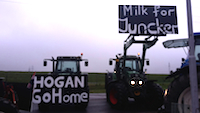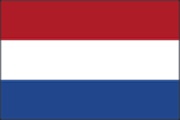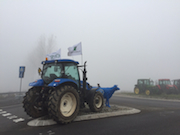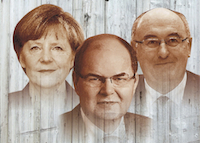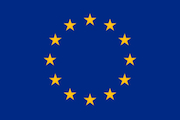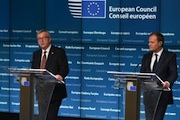EMB Newsletter January 2016
Newsletter as PDF
Contact
EMB - European Milk Board asbl
Rue de la Loi 155
B-1040 Bruxelles
Phone: +32 - 2808 - 1935
Fax: +32 - 2808 - 8265
Dear dairy farmers and interested parties,
A difficult and challenging year for farming has come to an end.
For me it is now abundantly clear that the ‘toolbox’ of policy instruments available to the Commission to support milk price in the post-quota era is woefully insufficient. It’s quite possible that this was also the situation during the quota era but the existence of quotas -this one fixed factor - gave the market some degree of stability. Now, with quotas gone and farmers’ incomes absolutely ravaged by wild volatility, even the Commission has to face the fact that this situation cannot continue. It’s time to put down the policy pea-shooters and get some real firepower.
To those who say that the market must set the price and that the market cannot be wrong, I simply state that the market can – and very often is - completely wrong. The market has a lot of help getting it wrong on milk price. There are those who profit from the chaotic swings in milk price and farmer income volatility. Very powerful elements further along the food supply-chain have a vested interest in these wild swings: the food retail corporations are left unregulated by either governments or the Commission and they have been given a licence to operate a ‘win-win’ relationship with farmers and primary producers: when supply is short, they ‘brick off’ their own margins and hike up the price to the consumer, when supply is abundant they cut the price to processors and farmers and gobble up the extra margins. These corporations have been allowed set their own agendas for decades now without so much as a squeak of protest from either government or the EU. If anyone questions their dominance they retreat behind some platitude about giving ‘cheap food’ to the EU’s consumers and that is deemed to excuse the wreckage they have made of Europe’s family and small farm system. Milk price to farmers all over the EU has fallen by anywhere from 30% to 40%. How much did it fall in the supermarkets? Across the EU the milk price paid by consumers fell by an average of 2%. That small statistic tells you a great deal about who benefits from the current system of ‘no-questions-asked and no-answers-needed’
2016 must see us demanding that the Commission finally summons up the courage and sense of justice to redress this manifest unfairness because it goes to the heart of the debate about sustainability. What about our sustainability? Who’s worried about the threat to sustainability contained in a 35% to 40% fall in dairy farmer income of the sort we saw this year and which threatens to continue into 2016?
That’s EMB’s job. It’s our job. And we have to try even harder.
I’ll end by wishing you and yours a happy and healthy 2016.
John Comer, Member of the EMB Executive Board and President of ICMSA Ireland
‘Milk for Juncker’ campaign
Press release: Big European dairy introduces voluntary restraint on delivery
Belgium: overproduction results in losses
Current situation in Italy
Germany: poster campaign against Merkel, Schmidt & Hogan
Good news story: EU outlook on agriculture
Fighting mega deals - The indignation against TTIP must lead to a movement
Impressum
European Milk Board asbl
Rue de la Loi 155
B-1040 Bruxelles
Phone: +32 2808 1935
Fax: +32 2808 8265
E-Mail: office@europeanmilkboard.org
Website: http://www.europeanmilkboard.org

